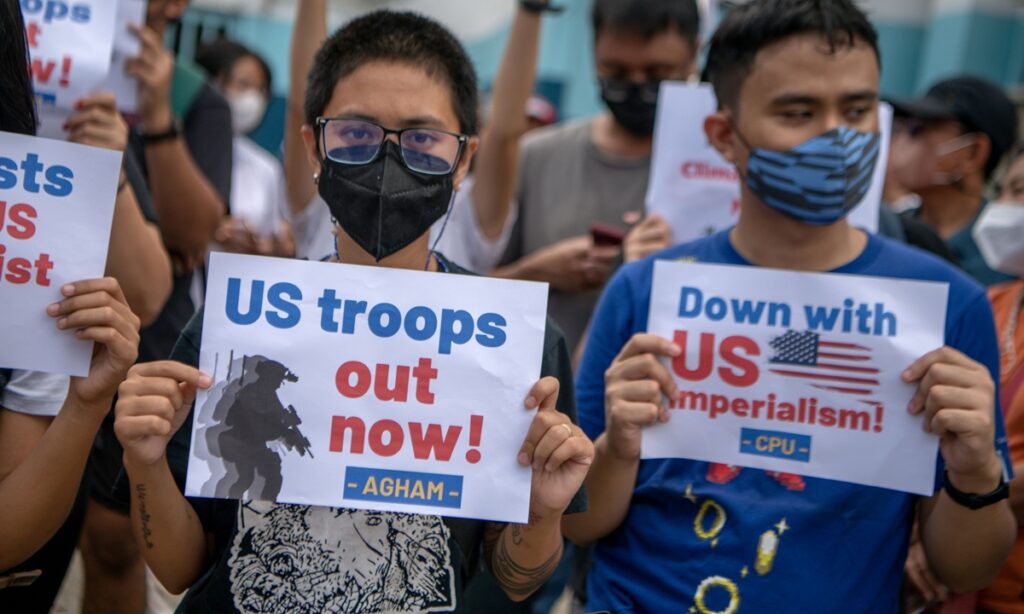
Editor’s Note:
The US is seeking to expand military presence in the Philippines and put the Philippines on the frontline of US’ anti-China campaign. What consequences will this move bring to the Asia-Pacific region? What the Philippines can do to avoid being a pawn of the US? Anna Malindog-Uy (Anna), senior research fellow of Global Governance Institution, and vice president of External Affairs of the Asian Century Philippines Strategic Studies Institute, shared her views with Global Times (GT) reporter Wang Zixuan over these issues.
GT: How do the locals respond to the expansion of US’ military presence in the Philippines? What are your concerns over the expansion of Enhanced Defense Cooperation Agreement (EDCA)?
Anna: There were several protests against the expansion of EDCA, an agreement that allows the US to put up additional four military bases in the Philippines. Many locals don’t like it. So that’s why there were protests against it. You can see that across social media, especially in the Philippines, the issue is being discussed by many locals. I think they’re not in favor of this.
The situation is quite worrisome, as far as I’m concerned, they have done the deal, it’s a matter of time that the so-called four additional EDCA bases will be put up, though the Philippine government said that they would conduct some kind of consultation with the local government officials. That is the situation. For me, it’s getting worrisome in many ways.
The most worrying thing when we talk about the EDCA is the expansion of additional bases, some of them are actually located in the north of the Philippines, which is facing the island of Taiwan. The others are facing the South China Sea. That is quite worrisome for us, it’s a provocation against China to put up that kind of military installation facing the Taiwan island and the South China Sea. The Taiwan question is a sensitive issue, and China and the Philippines have a dispute over the South China Sea.
It is not just the installation or the infrastructure itself that is worrisome. What is also worrisome is the deployment of US military troops, and even the prepositioning of military assets. Any country that has the sense of independence or wants to preserve sovereignty will not allow this.
It puts my country in a very compromising situation. But the US is justifying it by claiming there will be economic benefits. They are saying that it’s because of disaster, preparedness, and all of this crap. But basically, it boils down to one thing: militarization of the country. The US is trying to look at the Philippines as its new military asset. This is compromising our own independence as a country and our sovereignty.
There are many discussions right now across the globe about the impending World War III. We know that the US is always very busy with this kind of thing. We don’t want my country to be the launching pad for any kind of conflict in the Asia-Pacific. But because of the expansion of EDCA, the kind of possibility is there.
GT: As you mentioned China, how will the US’ move in the Philippines affect China-US relations, China-Philippine ties and even the situation in Asia-Pacific region?
Anna: I think this kind of provocation on the part of the US in the Philippines will contribute to the already deteriorating relationship between the US and China and even a new cold war. That is not good, not only for the two countries, but for the whole world.
If you militarize one country in the Asia-Pacific region, the tendency for other countries is to militarize too. So it may provoke an arms race in the Asia-Pacific region and even ASEAN. This will create instability. It makes the whole region, especially the ASEAN region and the wider Asia-Pacific region, quite volatile, and any time that there are miscalculations on the ground, a conflict will emerge. That is a very difficult situation now.
During the time of Duterte, the Philippines managed to strike a balance between the US and China, and that was the time when our economic relationship with China deepened. But this time around, it’s a different issue. It’s not an independent foreign policy in whatever sense, which has leaned toward the US. Politically, it has an impact on the relationship between China and the Philippines, but as to how it will impact more and in terms of manifestations of such kind of adverse impacts on the relationship of the two countries, I think that remains to be seen in future.
Right now many people are still trying their best to persuade the current government not to push through with the expansion of EDCA. There is also the push from the side of the US to influence and guide, and to ensure that the foreign policy of the Philippines would be leaning toward the US. That’s the sad reality at the moment that many Philippines, who understand these things and its impact and ramifications, are worried about. That’s why we’re speaking against it as much as possible locally, nationally and internationally.
GT: You have mentioned the need to renegotiate or cancel the EDCA and other documents. What efforts do you think are needed to achieve this?
Anna: The Philippines doesn’t have an enemy. But the Americans are trying to hype up everything. The disputed South China Sea is always being used by the Americans for their own purposes. That’s why it becomes complicated.
The Philippines doesn’t have an enemy, while the US has a lot of enemies. So if they engage in a war, even if we are not part of it, we are obliged because of the US-Philippine Mutual Defense Treaty, why would we be part of a war that it’s not our own making but it’s the US that makes it? It’s not mutual at all or beneficial.
The other two is the Visiting Forces Agreement (VFA) and EDCA, EDCA is about the installation of military bases by the US. The other one is troops deployment in rotational basis. In the 1987 Constitution of the country, it’s evident that the Constitution prohibits foreign troops in the Philippines and also foreign military bases. It says that the Philippines should follow or adopt an independent foreign policy.
If that’s the case, these are all unconstitutional. Now if it’s unconstitutional, then why do you have to have them? It violates the basic law of the country. The American justifies it as like it’s rotational, arguing that anyway, it’s not permanent bases. All of these things always have some kind of scapegoat to speak of. So these are the reasons why we are pushing for the abolition of this military alliance or military agreements with the US.
GT: China and the Philippines are close geographically, and the Philippines is one of China’s important trading partners, in what areas do you think China and the Philippines can strengthen cooperation to address the current complex geopolitical situation?
Anna: The two countries are close geographically. I think we have so far good relations, especially in the economic front. If only the two countries can manage their differences in the South China Sea in a proper manner – it’s usually the Philippines who pursues megaphone diplomacy – and seek to address it in a way that the two countries can talk without a third party coming in, the dispute can be addressed to a greater extent.
People-to-people relations are very important. There are a lot of misconceptions about China in the Philippines. Many locals have been poisoned by Western media. The propaganda of Western media is affecting the psyche and the perception of many Philippines. If that’s the case, I think people-to-people relation has to be enhanced further. For example, having more Philippine students studying in China, more academic exchanges between professors and business trips.
Another one is probably to help the Philippines in agriculture, because agriculture is one of our sectors that are very problematic at the moment. Also, tourism is a good area that can promote exchanges and interactions between peoples.
Source: Global Times
https://www.globaltimes.cn/page/202303/1287510.shtml



